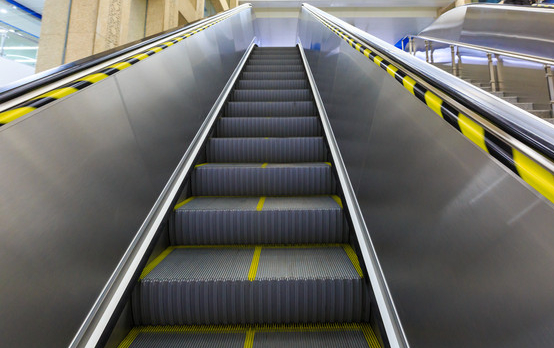(单词翻译:单击)
Subway passengers in some Chinese cities are not standing on the right side of escalators and sparing the left side for those to walk through.
中国一些城市乘坐地铁的乘客在进站的时候并没有站在自动扶梯的右边、把左侧留给那些走过的人。
An earlier report hit the Internet saying that Nanjing city in eastern China only requires subway passengers to stand firm and hold the handrail rather than to stand on the right side as it did formerly.
早先有一份报告在网上造成了轰动,称南京市只要求地铁乘客站稳并抓好扶手,而并没有像以前那样要求乘客一定要靠右站。
The Nanjing Subway Group explained on their Weibo account that it found 95 percent of escalators were seriously worn on the right side.
南京地铁公司在其微博上解释称,他们发现95%的自动扶梯的右侧都严重磨损。

Shi Dajiang from the city's public security bureau agreed that standing on the right side will speed up the abrasion of the escalator, shorten the service life and increase risk of breakdown.
来自南京市公安局的石大江对此表示赞同,他称靠右站会加剧自动扶梯的磨损、缩减使用寿命、并且加大扶梯损坏的风险。
Station staff also said the escalator step is 21 centimeters in height, six centimeters higher than the height of the public stairs. It is dangerous to walk on the operating escalators.
地铁站工作人员也表示,自动扶梯每一层的高度为21厘米,比公共阶梯要高6厘米。在运行中的自动扶梯上行走是非常危险的。
Guangzhou canceled the standard to stand on the right side of escalator about ten years ago. Ye Zichuan from the Guangzhou subway publicity department said they have investigated escalator accidents, finding that more than 90 percent of the accidents were caused by passengers walking through the escalator.
广州在大约10年前取消了自动扶梯靠右站的标准。广州地铁宣传部门的叶子川表示,他们对自动扶梯事故进行了调查,发现超过90%的事故是由于乘客在自动扶梯上行走造成的。
But some netizens support the international standard to stand on the right side of the escalator, saying the standard is popular in many countries and there are few escalator accidents in those countries.
但是一些网民支持在自动扶梯上靠右站的国际标准,称许多国家都使用了这一标准,但是却很少发生扶梯事故。
Other netizens argue that the international standard is not necessarily feasible in China. With the large population and the crowded rush hours in big cities, they say standing on the right side and allowing walk-through traffic on the left doesn't fit in China.
而其他一些网民则争论称,这一国际标准并不一定适用于中国。他们指出大城市在高峰时期会有大量的乘客通过,靠右站、使得左侧可以让人通过的做法并不适合中国。


